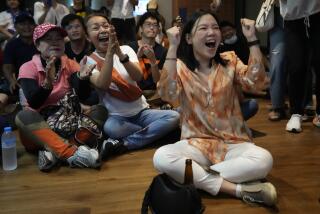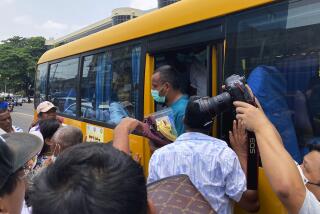Burma’s Shangri-La Image Hides Ailing Economy, Authoritarian Rule
- Share via
RANGOON, Burma — Burma’s quarter-century of self-isolation and one-man rule has produced a string of contradictions: a shattered economy in a bountiful land, Marxist slogans mingled with Buddhist religious chants, a people who move to the pace of the bullock cart while their neighbors harness computers.
Casual visitors are invariably enthralled. They return home with descriptions of a Shangri-La frozen in time, a throwback to an older, traditional Asia fast vanishing just about everywhere else in the shadows of skyscrapers and the impact of traffic snarls and Western ideas.
Indeed, a case can be made for Burma’s ways.
Crime and pollution are minimal, stress diseases are uncommon and the extended family is still vital. Its strict neutrality has kept it out of international turmoil.
Rangoon, its low-rise, tree-lined capital, evokes nostalgia for Imperial Britain that left behind colonnaded edifices, riverside promenades and charming suburban bungalows.
Buddhist pagodas dot the plains and hills, spirits roam the rural imagination and even the poorest farmers insist on inviting strangers in for a meal or tea.
Turmoil Beneath Surface
But beneath these exotic surfaces are increasingly harsh political and economic realities.
Traditionally called the Golden Land because of its great natural wealth and set upon a democratic course at independence from Britain in 1948, Burma today ranks among the 10 poorest countries in the world and is ruled by an authoritarian who has snuffed out all opponents and stifled initiative.
Ne Win, who heads Burma’s sole political entity, the Burma Socialist Program Party, has proved one of the world’s most durable leaders. The secretive, 75-year-old strongman seized power in a 1962 military coup and imposed an amalgam of Marxist economics, Buddhism and military rule. It is called “The Burmese Way to Socialism.”
Thousands were jailed during Ne Win’s early years in power, and potential challengers since have been purged.
Ne Win, who has never attended an international conference or been interviewed, slammed shut Burma’s door and has reopened it only slightly in more recent times. Foreign tourists now are allowed into the country, but they can stay only a week, and parts of the country are off-limits because of Burma’s hidden wars--a string of insurgencies by minority ethnic groups.
Japanese Offices Closed
The government has refused to allow joint private ventures with foreign companies and at the end of last year closed the offices of all Japanese businesses in Burma, even though Japan provides about two-thirds of the country’s aid and loans.
Ne Win’s credo is state control of the economy and military control of the state. About three-fourths of all executive government positions are held by active or retired military officers.
“When a king goes into business, the country goes to ruin” is an old saying Burmese use to explain why Burma is in such dismal shape despite its fertility, wealth of mineral and energy resources and a population of only 38 million.
Although Ne Win’s Burma never experienced the liftoffs witnessed elsewhere on the continent, there were promising signs in the early 1980s. However, over the last year the economy and quality of life have plunged to perhaps their lowest levels.
Foreign Debt Climbs
The country’s foreign debt is up to nearly $3 billion while hard currency reserves have plunged to $35 million to $55 million, roughly one month’s worth of imports. The annual per capita income is below $200, and prices have soared since early 1986.
With production slowdowns, Western analysts and Burmese sources say there is greater reliance than ever on the vast black market--or shadow economy--stocked with smuggled goods from nearby Thailand, India, China and Malaysia as well as those siphoned off from government factories and stores.
The average civil servant, who has not had a wage increase in 11 years, must rely heavily on the black market, where many prices are pegged to an illegal dollar exchange rate. A government worker can spend his monthly pay of 500 kyat--$75 at the official rate of exchange, $12 on the black market--for one pair of jeans and a can of coffee.
The price of rice, a Burmese staple, has doubled over the last year to the equivalent of 3.5 cents a pound at the free-market rate. Chicken is up 50% to 53 cents a pound, and fish also has increased by 50% to 62 cents a pound. Those increases are small by Western standards, but they are sizable for Burmese families with low incomes.
Western diplomats and Burmese sources say corruption has mushroomed and sporadic violence has flared in recent months. Urban unrest may grow in coming months if rice becomes in short supply for the people of what was once the world’s largest rice exporter.
Opposition Scattered
“Things are worse than I’ve seen at any time,” said Josef Silverstein, a leading American expert on Burma, after a recent visit. “But I still think Ne Win is strong. . . . There is no opposition leadership, so the grumbling goes nowhere.”
Despite a decade of rumors about Ne Win’s poor health, there are few signs that the golf-playing, six-times-married leader is giving up his power.
Perhaps Rangoon’s favorite guessing game is “After Ne Win, Who?”
While a smooth transition of power to President U San Yu, the No. 2 man in the hierarchy, is possible, some are betting on post-Ne Win turmoil within the military. Those hoping for a more liberal Burma point to reported dissatisfaction among younger, possibly pro-Western, officers in the field.
“I’m convinced the army is more fractured than we can see,” said Silverstein, the author of several books on Burma. “When Ne Win goes, it will break open. Conflicting loyalties which were papered over will emerge.”
With all media under total government control and all opposition parties banned, it is difficult to plumb the depth of dissent. However, open rebellion in the shape of a dozen insurgencies is in full play.
Communist Rebels, Warlords
The central government controls roughly two-thirds of the country. The rugged border areas are in the hands of the Burmese Communist Party, plus an array of ethnic minority groups seeking autonomy and warlords who traffic in opium.
None of these appear to pose an immediate threat to Rangoon, but about 30% of the current budget has been assigned to Burma’s 200,000-member military, which often battles better-armed rebels. Hundreds are killed each year in the shadowy wars, and the few attempts at negotiations in recent years have all broken down.
More to Read
Sign up for Essential California
The most important California stories and recommendations in your inbox every morning.
You may occasionally receive promotional content from the Los Angeles Times.










